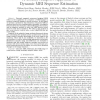Free Online Productivity Tools
i2Speak
i2Symbol
i2OCR
iTex2Img
iWeb2Print
iWeb2Shot
i2Type
iPdf2Split
iPdf2Merge
i2Bopomofo
i2Arabic
i2Style
i2Image
i2PDF
iLatex2Rtf
Sci2ools
TIP
2002
2002
A doubly adaptive approach to dynamic MRI sequence estimation
Dynamic magnetic resonance imaging (MRI) refers to the acquisition of a sequence of MRI images to monitor temporal changes in tissue structure. In this paper we present a method for the estimation of dynamic MRI sequences based on two complimentary strategies: an adaptive framework for the estimation of the MRI images themselves, and an adaptive method to tailor the MRI system excitations for each data acquisition. We refer to this method as the doubly adaptive temporal update method (DATUM) for dynamic MRI. Analysis of the adaptive image estimate framework shows that calculating the optimal system excitations for each new image requires complete knowledge of the next image in the sequence. Since this is not realizable, we introduce a linear predictor to aid in determining appropriate excitations. Simulated examples using real MRI data are included to illustrate that the doubly adaptive strategy can provide estimates with lower steady state error than previously proposed methods and al...
Adaptive | Dynamic Mri | Image | TIP 2002 |
Related Content
| Added | 23 Dec 2010 |
| Updated | 23 Dec 2010 |
| Type | Journal |
| Year | 2002 |
| Where | TIP |
| Authors | William Scott Hoge, Eric L. Miller, Hanoch Lev-Ari, Dana H. Brooks, Lawrence P. Panych |
Comments (0)

